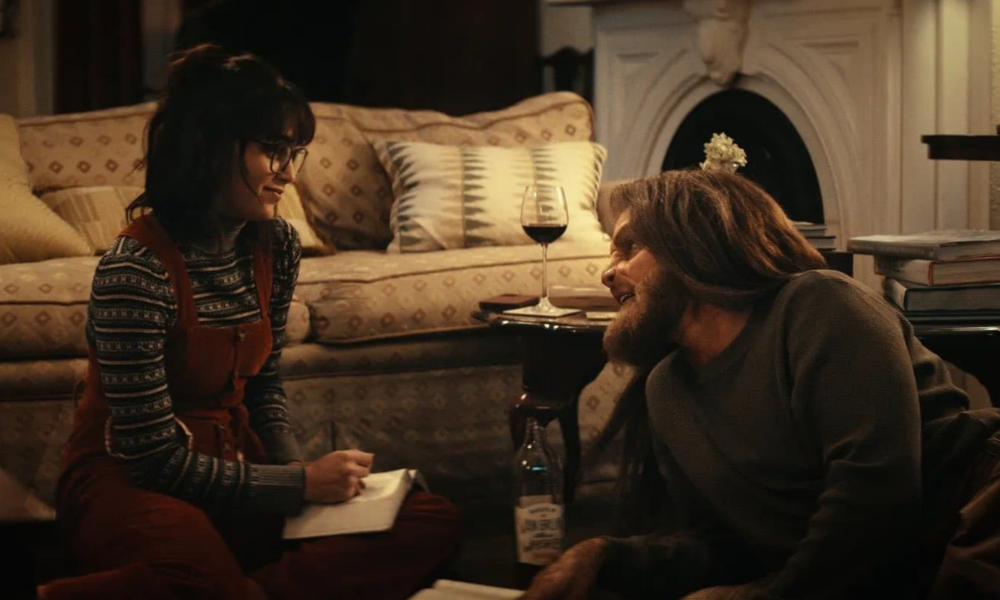Caroline Lindy’s Your Monster is a refreshingly unique anti-romantic comedy-horror that stands out by blending human vulnerability with a quirky supernatural twist. Building upon her 2019 short film of the same name, Lindy crafts a story that doesn’t shy away from themes of illness, heartbreak, and self-acceptance, creating a narrative both haunting and heartfelt. With its snappy dialogue, offbeat charm, and relatable protagonist, Your Monster invites audiences to confront their own inner “monsters” while delivering a story that feels both darkly funny and oddly therapeutic.
Premise:
Melissa Barrera stars as Laura Franco, a young actress facing one of life’s roughest patches. After receiving a cancer diagnosis, she’s also forced to endure the pain of a breakup with her ex, Jacob (Edmund Donovan), who, it seems, hasn’t made her recovery any easier. As Laura stumbles through her fragile state, she makes a strange discovery that changes everything: a Monster, played with an oddly endearing touch by Tommy Dewey, living in her closet.
The Monster and who he is:
The Monster isn’t just a symbol of fear or the unknown but comes across as an amalgamation of Laura’s insecurities, unresolved trauma, and unmet emotional needs. While Your Monster could have easily fallen into familiar horror tropes, Lindy takes a refreshing approach by giving the Monster a complex personality. He is a creature with quirks, vulnerabilities, and even a sense of humor. This layered portrayal transforms the Monster from a mere scare tactic into an unconventional companion for Laura, blurring the lines between foe and friend.
The Monster also seems to echo Laura’s emotional baggage, a reflection of the things she’s too afraid to confront. By personifying her internal struggles, Lindy skillfully allows the audience to explore Laura’s psyche and her journey toward self-acceptance and healing in a highly visual and metaphorical way. This creative setup lends the film both a therapeutic quality and a touch of humor, as Laura wrestles with her unexpected “roommate.”
Melissa Barrera needs an Oscar:
Melissa Barrera shines in the role of Laura, bringing a raw and nuanced performance that captures the struggles of illness, isolation, and heartbreak. Her portrayal makes Laura both relatable and complex, a character who is far from the typical horror heroine. Laura’s experience feels grounded, particularly as Barrera balances Laura’s vulnerability with a sharp wit that never lets the film drown in despair. Barrera’s comedic timing further accentuates the film’s anti-romantic vibe, creating a protagonist who is more than capable of fending off her own demons — even if they happen to reside in her closet. She has never failed to deliver truly great performances. This is the kind of performance that absolutely demands to be Oscar-nominated. It won’t happen because it’s an unconventional horror-esque film, but it really should.
Tommy Dewey is wonderfully charming:
Tommy Dewey as the Monster brings unexpected charm to the role, infusing this literal manifestation of fear with a degree of empathy and warmth. Rather than simply lurking in the shadows or jumping out for shock value, the Monster engages with Laura in a way that adds both tension and unexpected moments of humor. Dewey’s deadpan humor and subtle quirks create a dynamic that both intrigues and disarms the audience, playing off Barrera’s quick-witted Laura. The chemistry between Barrera and Dewey is undeniable, blending comedic tension with the thrill of uncertainty, resulting in scenes that vacillate between fear and unexpected tenderness.
Supporting cast:
The supporting cast also adds dimension to the narrative. Edmund Donovan’s portrayal of Jacob captures the frustrations and complexities of a fractured relationship, providing a sharp contrast to Laura’s evolving bond with the Monster. Kayla Foster as Mazie and Meghann Fahy as Jackie Dennon round out Laura’s world, grounding her interactions with others and highlighting her detachment from typical social circles, making her relationship with the Monster even more compelling.
Superb direction:
Lindy’s direction is filled with clever touches, setting up a whimsical, horror-infused atmosphere that leans heavily into the emotional rather than the terrifying. She crafts Laura’s world as one marked by existential dread, but it’s balanced by snarky humor and a touch of absurdity that keeps the story from feeling overwhelmingly bleak. The film’s tone is masterfully nuanced; while it has moments of true eeriness, it’s Lindy’s comedic timing and dialogue that make Your Monster something special. The narrative continuously teeters on the edge of horror without ever fully diving in, making it more of a character study that incorporates horror elements rather than a traditional horror film.
How horror is it?:
Though Your Monster is labeled as horror-comedy, the horror here is restrained, a choice that both strengthens and limits the film. The Monster’s presence serves more as an exploration of Laura’s fears and insecurities than as a traditional horror figure, so those looking for scares may find the film’s terror elements underwhelming. However, this approach allows Lindy to create a film that is ultimately more introspective and layered, putting the focus squarely on Laura’s journey toward self-acceptance rather than on cheap thrills.
Visuals:
Visually, Your Monster shines, especially in its careful use of lighting and shadow to build atmosphere. Cinematographer Will Stone captures Laura’s world with a muted color palette that reflects her emotional state, using shadows and dark tones to hint at her internal struggles. The shots within Laura’s apartment are cleverly framed, with the closet looming ominously, creating a confined, claustrophobic feel that underscores Laura’s sense of entrapment in her own life. The apartment setting serves as both a physical and psychological space where Laura is forced to confront her inner demons, enhancing the sense of intimacy and immediacy.
The Monster’s design is another highlight, striking a balance between menace and charm, with features that are grotesque yet oddly endearing. The creature’s design adds to the film’s dark comedy, as his appearance is exaggerated enough to provoke humor but still eerie enough to embody Laura’s fears.
Flaws:
While Your Monster is refreshingly unique, the film does have some minor shortcomings. As mentioned, the horror elements are downplayed, which might leave genre fans wanting more in terms of scares and tension.
Additionally, the quirky humor and intimate dialogue-heavy style may not resonate with everyone. The film’s anti-romantic comedy approach and exploration of personal demons are its strengths, but they may limit its appeal to a more niche audience.
Overall:
Your Monster is an unconventional delight that defies easy categorization. Caroline Lindy’s thoughtful direction and smart script weave horror, comedy, and introspection into a story that’s both engaging and thought-provoking. Melissa Barrera and Tommy Dewey’s chemistry elevates the film, drawing the audience into a strange yet intimate world where fears are given life and friendship can be found in the most unexpected of places.
-
Acting - 10/10
10/10
-
Cinematography/Visual Effects - 8.5/10
8.5/10
-
Plot/Screenplay - 8.5/10
8.5/10
-
Setting/Theme - 9/10
9/10
-
Watchability - 9/10
9/10
-
Rewatchability - 8/10
8/10












